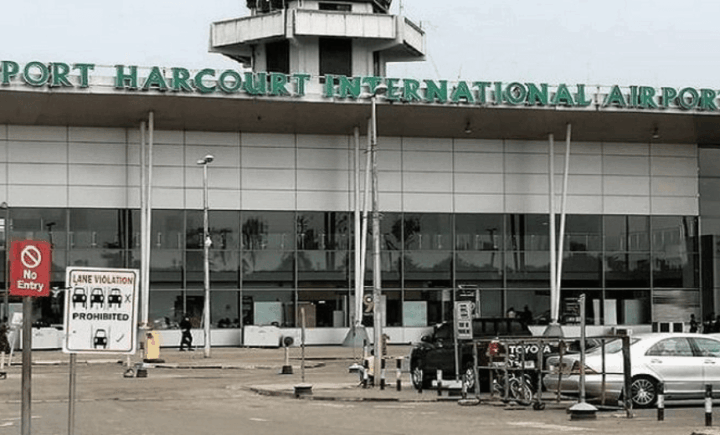Flight operations at the Port Harcourt International Airport were significantly disrupted on Thursday following an incident involving a commercial aircraft that veered off the runway during landing. The event caused delays for both arriving and departing flights, affecting hundreds of passengers and triggering an emergency response from aviation authorities.
The aircraft, operated by a domestic airline, was arriving from Lagos when it reportedly skidded off the landing strip due to what preliminary reports suggest may have been poor visibility and a slippery runway surface caused by heavy rainfall earlier in the day. The plane came to a stop on the grassy area adjacent to the main runway, with all passengers and crew members safely evacuated without injury. Emergency services were immediately deployed to the scene, including fire and rescue teams, who responded swiftly and ensured that no fire or secondary incidents occurred.

Eyewitnesses said the landing appeared normal at first until the aircraft suddenly swerved to one side after touching down. Some passengers reportedly panicked as the plane jolted, but the flight crew maintained calm, quickly bringing the situation under control. Cabin crew guided passengers through safety protocols and assisted with the evacuation after the aircraft came to a stop.
Passengers described the experience as frightening, with many visibly shaken upon disembarking. One passenger, Ibrahim Usman, recounted how the aircraft’s wheels made a loud, unusual sound on touchdown before it veered off the centerline. According to him, “We were already clapping because we thought we had landed safely, then the plane suddenly turned sharply and left the runway. It was terrifying, but the crew was very professional and kept us calm.”
Following the incident, airport officials temporarily closed the affected runway to allow aviation safety inspectors and recovery teams to assess the situation. This led to the diversion of some incoming flights to nearby airports, including Owerri and Enugu, while several outgoing flights were delayed or cancelled altogether.
In a statement issued shortly after the incident, the Federal Airports Authority of Nigeria (FAAN) confirmed that normal operations had been suspended temporarily to ensure the safety of all airport users. FAAN added that aviation security, fire services, and technical staff were working with the airline and the Nigerian Civil Aviation Authority (NCAA) to remove the aircraft and resume normal traffic as soon as possible.
The NCAA also announced that it had launched an investigation into the incident to determine the exact cause and whether there were lapses in operational procedures, weather assessment, or mechanical systems. Officials said flight data recorders would be reviewed and maintenance records would be inspected to understand what led to the runway excursion.
Meanwhile, passengers waiting to board other flights expressed frustration over the lack of timely information from airlines regarding the status of their flights. Some said they had been left in waiting areas for hours without clear communication or alternative travel arrangements. Affected travelers called on airlines and airport authorities to improve their crisis response protocols and ensure better communication during emergencies.
Airline representatives later addressed passengers and expressed regret over the inconvenience caused by the disruption. They assured customers that safety remained the highest priority and that all necessary support would be provided, including rebooking and accommodation for those stranded.
The aircraft involved in the incident was eventually towed off the runway several hours later after engineers completed a thorough inspection to ensure it could be safely removed. FAAN confirmed that runway operations resumed under restricted capacity shortly after, and full operations were expected to normalize by the end of the day.
Aviation experts who spoke on the matter emphasized the need for continuous investment in runway infrastructure, especially in light of Nigeria’s heavy rainy season. They noted that adequate drainage systems, runway surface integrity, and accurate weather forecasting play crucial roles in preventing such incidents. They also advised airlines to enhance pilot training, particularly for landing in adverse weather conditions.
The Port Harcourt International Airport, one of Nigeria’s busiest domestic and regional flight hubs, has seen increased traffic in recent months due to growing demand for air travel. Thursday’s incident, though without casualties, has renewed discussions about aviation safety standards, emergency readiness, and infrastructure resilience.
As operations resume, the focus now shifts to the outcome of the NCAA’s investigation and the possible recommendations that may follow. For many passengers, the incident was a close call that underscored the importance of aviation vigilance and the professionalism of flight and ground crews during emergencies. While normalcy has been largely restored, the memory of the sudden runway departure lingers as a reminder of the unpredictable nature of air travel and the critical role of safety measures in the aviation industry.
Support InfoStride News' Credible Journalism: Only credible journalism can guarantee a fair, accountable and transparent society, including democracy and government. It involves a lot of efforts and money. We need your support. Click here to Donate
